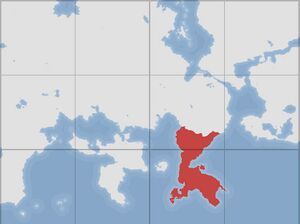Greater Tralka
This article is incomplete because it is pending further input from participants, or it is a work-in-progress by one author. Please comment on this article's talk page to share your input, comments and questions. Note: To contribute to this article, you may need to seek help from the author(s) of this page. |
The Greater Tralkan Republic | |
|---|---|
|
Flag | |
| Motto: "In Defense of the People." | |
| Anthem: "Heart of the Tralkans" | |
| Capital and largest city | Vieskov |
| Official languages | Standard Tralkan |
| Recognised regional languages | Cezskan Torovskan Voldinan |
| Demonym(s) | Tralkan |
| Government | Constitutional Stratocratic Republic |
• Grand Marshal | Alois Pacek |
| Legislature | Assembly of Public Policy |
| Area | |
• | 425,437 km2 (164,262 sq mi) |
| Population | |
• 2021 estimate | 12,890,741 |
• 2020 census | 12,763,110 |
• Density | 30/km2 (77.7/sq mi) |
| GDP (PPP) | 2020 estimate |
• Total | $526.606 billion |
• Per capita | $41,260 |
| GDP (nominal) | 2020 estimate |
• Total | $439.345 billion |
• Per capita | $34,423 |
| Currency | Tralkan Kroner (GTK) |
Greater Tralka is a stratocracy in southern Thrismari. It borders Lyonheimer to the north. Greater Tralka is a relatively new nation comprised of the various peoples of the Tralkans, who share a common history and similar languages.
History
Ancient History
Medieval History
Colonial Era
Revolutionary Era
The Great War
Contemporary History
Government
The government of Greater Tralka is effectively a stratocratic republic, where suffrage is earned through military service and public office is reserved for individuals who hold or have held certain military ranks. Greater Tralka has a constitutional government, in that the state is bound by a charter agreed to by its constituent substates. This charter outlines the structure and limitations of the federal government, separating powers into different assemblies of senior officers, and guaranteeing many civil and human rights for the citizens of Greater Tralka.
Greater Tralka is comprised of eight semi-autonomous regions that represent each of the signatory states of the Tralkan Charter. Domestic affairs are largely handled by these substates, which maintain local democratic governments.
Defense Council of Greater Tralka
The Defense Council is the executive branch of the Greater Tralkan federal government. It is a body of currently 20 officials that is responsible for commanding the armed forces and implementing the laws that pass the Assembly of Public Policy. Each of the 20 members is the head of an executive department, whose roles are either defined in the Tralkan Charter or set out by the Assembly when a new department is created. The Defense Council is headed by the Grand Marshal, the effective Head of State, Head of Government, and Commander-in-Chief of Greater Tralka, who must be a sitting member of the Council and is elected by its members every 4 years.
To be appointed to the Defense Council, a candidate must be an active member of the Greater Tralkan armed forces of rank Lieutenant General (or the branch equivalent) or higher. New members of the Defense council are appointed by the Grand Marshal and confirmed by a majority of both the sitting members of the Defense Council and the Assembly.
Assembly of Public Policy
The Assembly of Public Policy is the legislative branch of the federal government of Greater Tralka. Members of the Assembly write, discuss, debate, and vote on policies that pertain to the whole of Greater Tralka.
Elections for seats on the Assembly are held every four years, and voting is open to all active members of the armed forces of Greater Tralka. To run for office, one must be an active commissioned officer of the armed forces of Greater Tralka of any rank, and must have demonstrated high aptitude in their field of study and detailed knowledge of the Tralkan charter in standard examinations.
Economy
Greater Tralka has a mixed social market economy, with the right to private property being guaranteed by the Tralkan Charter. However, the charter allows the Assembly of Public Policy to regulate the economy as needed through taxes, subsidies, and public spending, and economic policy has become one of the most contested topics in Tralkan politics.
Greater Tralka has a largely exports-oriented economy. Forestry has played an important role in the economy of the Tralkans since the beginning of recorded history, with its expansive taiga forests allowing ready access to lumber. In modern times, industrial self-sustained tree farms are considered one of the bedrocks of the Greater Tralkan economy, allowing secondary wood products industries to prosper, including furniture, paper, and construction materials. EverGreen Forestry Corporation, a vertical lumber and wood products conglomerate, is a notable Tralkan company with international recognition.
Foreign Relations
Greater Tralka currently maintains good relations with most of the nations in Thrismari and throughout the world, and is a member of both the Thrismari Union and the Anterian Socialist Republics Alliance.

